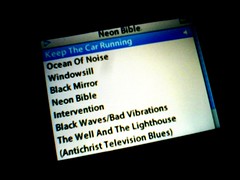Voltaire's Candide, 1 Corinthians 7 and Unwimpy Contentment
A stale-coffee bummer of a weekend spent mostly at work, with Arcade Fire's Neon Bible as office muzak. In the early hours of Monday morning, the howls of the storm and crashing of the thunder outside were easily folded into the rich instrumental layers of portentous pipe-organs, insistent strings and giggling glockenspiels.
Earlier this Labour Day morning, we rested from our labours. Straw-hats and sunshine. Blue skies, fresh air, a quick breakfast and some tending to the garden before getting nicely stuck into 1 Corinthians 7.
The after-rain morning was for a juicy earthworm and scattered seed buffet for the feathered ones; baby spotted-neck pigeons and orioles picking their way through the grass with scarcely a peep amongst them. We've lost a few plants to the recent spate of schizophrenic weather (having been alternately flooded and scorched) but the curry, lime and basil are holding their own remarkably. The weeds, however, have gone one better and proliferated profoundly. Clearly we need some sort of scavenging goat or Japanese poodle (woolly they be) to pop round for a chaperoned nibble.
Voltaire's LOL Candide ends with the titular character saying (in response to the belligerent pontificating and endless arguing of Pangloss and Martin over The Best of Possible Worlds, The Problem of Evil and The Freedom of Will),"That is very well put, but we must cultivate our garden."; that is, the proper response to unfathomable universal misery, despair, pain and generally being dealt with the poor lot in life is not to go around theorising about origins and "metaphysico-theologico-cosmoloonigology" but to hunker down and do some honest work in one's allotment; enforced blinkeredness in face of the absurdity of the vast universe.
The Christian knows that the universe is intricately ordered and under the perfect direction of God. It is not the best possible world of Pangloss because sin has rendered it fallen and under a curse. But there will come a time when God will redeem this broken world just as he has redeemed from death and destruction those who have trusted in Jesus Christ (Galatians 3:13, Titus 2:14, Hebrews 9:15). In the meanwhile, the redeemed, having been bought at the price of Jesus' very life, understand that their life is not their own: by the blood of Christ, they have been adopted as God's own sons (Galatians 3:13), they are now God's possessions zealous for doing his work (Titus 2:14).
The contentment Paul repeatedly advocates (1 Corinthians 7:17, 20 and 24) is far from boring suburban mundanity or cud-chewing passivity or dull doormattery. It is embedded-agent-on-a-mission-ly exciting. The redeemed have been called by God himself (1 Corinthians 7:17, 18, 21, 22, 24). He has called them out of darkness into the light, into salvation by trusting in Christ Jesus. It is a call to be part of God's people, not a call to levitating self-improvement nor to leap like gazelles with tambourines up a holy mountain nor to move up in a hierarchy of money-making monkeys.
God called us while we were decomposing in our little lead boxes. We did not, of our own accord and intelligence, break out to find him but he broke through to find us. He engaged us in whatever unworthy condition and dastardly individual situation we were in. He did not need hastily transplanted sunflowers lining our roads before deigning to turn our hearts and minds to him.
Now that we are his people, then, we ought to realise that just as we were called in whatever condition and situation we were in, so our condition in life is really unimportant. Uncircumcised or circumcised? Mate, God doesn't care. Doesn't count for anything. But be careful to obey God whever you are (1 Corinthians 7:18-19). Slave or free? Well, it might be a little bit more comfy to be free but don't be concerned about it. Freedom from human slavery is ultimately an irrelevance. Regardless, we are slaves of Christ and what's really important, what really counts, is doing his work (1 Corinthians 7:20-23).
We are not to devote our thoughts and energies to changing our circumstances. Instead, we are to obsess about living under God's word and doing his work wherever we are. No, "oh if only I were smarter/a better speaker/a high-flyer/a yacht-owner/on Forbes' list/looked better, if only I could go to an overseas missionfield, if only my personal life was better, I would be more effective for God". We are responsible to God in the life he has assigned to us. Bite the bullet and bloom where we are planted. (Secret agent plus gardening analogy. Score.)
1 Corinthians 7:17-24 is the key the rest of the chapter. Paul applies the principles to marrieds in 1 Corinthians 7:1-16 (with a taster on unmarrieds and widows) and unmarrieds and widows in 1 Corinthians 7:25-40. Lonely and unmarried or married to a naggy, poor, depressed spouse who sneers at your beliefs? Do not get into a hot bother about changing your circumstances. Get hepped up instead on working God's garden in your situation, being devoted to the Lord and being concerned for the salvation of those around you.*
The big problem is not guidance but obedience.
So no small-minded navel-gazing here please. Don't just think about temporal puny renovation on circumstances that will pass away in time. Think big! Think macro! Think eternal! Open your eyes to opportunities for faithfulness no matter what the situation! Get jiggy wid being part of God's plan in transforming the world for all time!
Fierce.
*that is not to say that it is a sin to change one's situation in life: unmarrieds and widows may marry (1 Corinthians 7:9), marrieds may separate if it is the wish of the unbelieving spouse (1 Corinthians 7:15). But changing one's status quo should never be the overarching passion of life.
Earlier this Labour Day morning, we rested from our labours. Straw-hats and sunshine. Blue skies, fresh air, a quick breakfast and some tending to the garden before getting nicely stuck into 1 Corinthians 7.
The after-rain morning was for a juicy earthworm and scattered seed buffet for the feathered ones; baby spotted-neck pigeons and orioles picking their way through the grass with scarcely a peep amongst them. We've lost a few plants to the recent spate of schizophrenic weather (having been alternately flooded and scorched) but the curry, lime and basil are holding their own remarkably. The weeds, however, have gone one better and proliferated profoundly. Clearly we need some sort of scavenging goat or Japanese poodle (woolly they be) to pop round for a chaperoned nibble.
Voltaire's LOL Candide ends with the titular character saying (in response to the belligerent pontificating and endless arguing of Pangloss and Martin over The Best of Possible Worlds, The Problem of Evil and The Freedom of Will),"That is very well put, but we must cultivate our garden."; that is, the proper response to unfathomable universal misery, despair, pain and generally being dealt with the poor lot in life is not to go around theorising about origins and "metaphysico-theologico-cosmoloonigology" but to hunker down and do some honest work in one's allotment; enforced blinkeredness in face of the absurdity of the vast universe.
Only let each person lead the life that the Lord has assigned to him, and to which God has called him. This is my rule in all the churches. Was anyone at the time of his call already circumcised? Let him not seek to remove the marks of circumcision. Was anyone at the time of his call uncircumcised? Let him not seek circumcision. For neither circumcision counts for anything nor uncircumcision, but keeping the commandments of God. Each one should remain in the condition in which he was called. Were you a slave when called? Do not be concerned about it. But if you can gain your freedom, avail yourself of the opportunity. For he who was called in the Lord as a slave is a freedman of the Lord. Likewise he who was free when called is a slave of Christ. You were bought with a price; do not become slaves of men. So, brothers, in whatever condition each was called, there let him remain with God. (1 Corinthians 7:17-24)Though appearing to deliver seemingly similar homilies of being content with one's station in life, the mindset of Paul in 1 Corinthians 7 is diametrically opposed to that of Voltaire. For the Christian, tending to one's proverbial garden is not done with a resigned shrug that working without useless speculation on the wide world is the best man can do with his un-understandable life; for the Christian, cultivating that garden is what life is really about and what man was created to do.
The Christian knows that the universe is intricately ordered and under the perfect direction of God. It is not the best possible world of Pangloss because sin has rendered it fallen and under a curse. But there will come a time when God will redeem this broken world just as he has redeemed from death and destruction those who have trusted in Jesus Christ (Galatians 3:13, Titus 2:14, Hebrews 9:15). In the meanwhile, the redeemed, having been bought at the price of Jesus' very life, understand that their life is not their own: by the blood of Christ, they have been adopted as God's own sons (Galatians 3:13), they are now God's possessions zealous for doing his work (Titus 2:14).
The contentment Paul repeatedly advocates (1 Corinthians 7:17, 20 and 24) is far from boring suburban mundanity or cud-chewing passivity or dull doormattery. It is embedded-agent-on-a-mission-ly exciting. The redeemed have been called by God himself (1 Corinthians 7:17, 18, 21, 22, 24). He has called them out of darkness into the light, into salvation by trusting in Christ Jesus. It is a call to be part of God's people, not a call to levitating self-improvement nor to leap like gazelles with tambourines up a holy mountain nor to move up in a hierarchy of money-making monkeys.
God called us while we were decomposing in our little lead boxes. We did not, of our own accord and intelligence, break out to find him but he broke through to find us. He engaged us in whatever unworthy condition and dastardly individual situation we were in. He did not need hastily transplanted sunflowers lining our roads before deigning to turn our hearts and minds to him.
Now that we are his people, then, we ought to realise that just as we were called in whatever condition and situation we were in, so our condition in life is really unimportant. Uncircumcised or circumcised? Mate, God doesn't care. Doesn't count for anything. But be careful to obey God whever you are (1 Corinthians 7:18-19). Slave or free? Well, it might be a little bit more comfy to be free but don't be concerned about it. Freedom from human slavery is ultimately an irrelevance. Regardless, we are slaves of Christ and what's really important, what really counts, is doing his work (1 Corinthians 7:20-23).
We are not to devote our thoughts and energies to changing our circumstances. Instead, we are to obsess about living under God's word and doing his work wherever we are. No, "oh if only I were smarter/a better speaker/a high-flyer/a yacht-owner/on Forbes' list/looked better, if only I could go to an overseas missionfield, if only my personal life was better, I would be more effective for God". We are responsible to God in the life he has assigned to us. Bite the bullet and bloom where we are planted. (Secret agent plus gardening analogy. Score.)
1 Corinthians 7:17-24 is the key the rest of the chapter. Paul applies the principles to marrieds in 1 Corinthians 7:1-16 (with a taster on unmarrieds and widows) and unmarrieds and widows in 1 Corinthians 7:25-40. Lonely and unmarried or married to a naggy, poor, depressed spouse who sneers at your beliefs? Do not get into a hot bother about changing your circumstances. Get hepped up instead on working God's garden in your situation, being devoted to the Lord and being concerned for the salvation of those around you.*
The big problem is not guidance but obedience.
So no small-minded navel-gazing here please. Don't just think about temporal puny renovation on circumstances that will pass away in time. Think big! Think macro! Think eternal! Open your eyes to opportunities for faithfulness no matter what the situation! Get jiggy wid being part of God's plan in transforming the world for all time!
Fierce.
*that is not to say that it is a sin to change one's situation in life: unmarrieds and widows may marry (1 Corinthians 7:9), marrieds may separate if it is the wish of the unbelieving spouse (1 Corinthians 7:15). But changing one's status quo should never be the overarching passion of life.
Labels: 1 Corinthians, Jubal's Legacy: Music, Rainy Day Shenanigans










3 Comments:
I love Arcade Fire and Neon Bible rocks. But I always did wonder about their lyrics. Personally I don't really believe in "satanic music" per se, but the words for some of my favourite songs like Intervention and (Antichrist Television Blues) are a bit iffy.
"Working for the Church while your family dies.
You take what they give you
And you keep it inside.
Every spark of friendship and love
will die without a home.
Hear the soldier groan, We'll go at it alone."
Their previous album Funeral was also deliciously dark and angsty, with lovely grand instrumentation, but I don't think they had such a strong religious theme.
I guess I should get my hands on Hell's Bells 2 :)
Lyrics are definitely key. I've always found it a bit of an uphill task locating biblical lyrics even in "Christian Music".
Neon Bible appears to me an essentially political album. Politics in Bush-era America being intimately linked with religion, Arcade Fire uses the perceived Christianity of the American-right as a sort of trope. So the tirade against the alignment of faith and commercialism - (Antichrist Television Blues)(apparently inspired by Joe Simpson), the fickleness of faith changed to suit man's fears or desires - The Well and The Lighthouse (retelling Jean de La Fontaine's The Wolf and the Fox), the hypocrisy of a Christian's life - Intervention etc.
There are scriptural references all about the lyrics. Did some digging. Apparently the Butler boys were raised as Mormons. For whatever it's worth they had this to say:
"There are two kinds of fear: The Bible talks a lot about fear of God — fear in the face of something awesome. That kind of fear is the type of fear that makes someone want to change. But a fear of other people makes you want to stay the same, to protect what you have. It's a stagnant fear; and it’s paralyzing." Neon Bible is allegedly about both sorts of fears.
*shrugs*
They could just be teasing. Or perhaps they are adding post-production coherence to the vapid emo-ness that is the proud badge of indie-hood.
Arcade Fire: A Neon Bible Study [21 Questions and Answers]
By David Buckna
(http://www.assistnews.net/Stories/2007/s07030103.htm)
Post a Comment
Subscribe to Post Comments [Atom]
<< Home